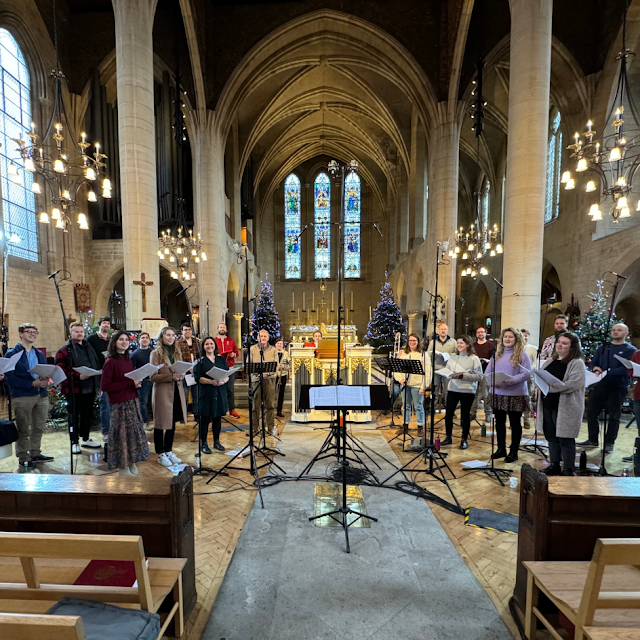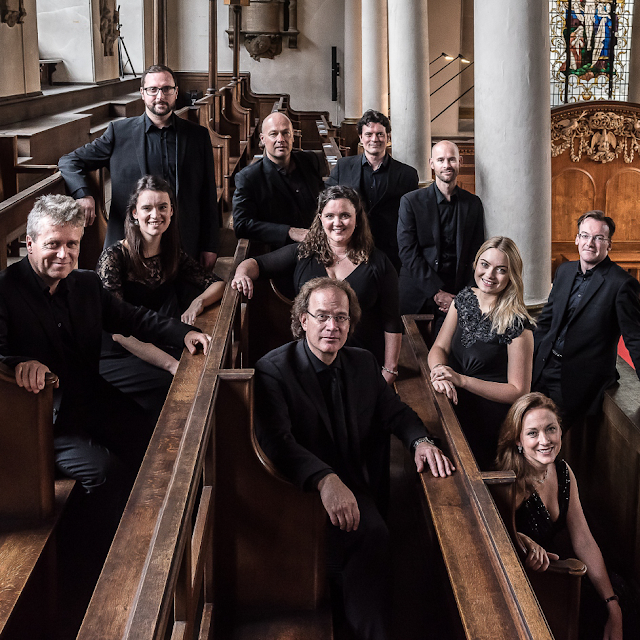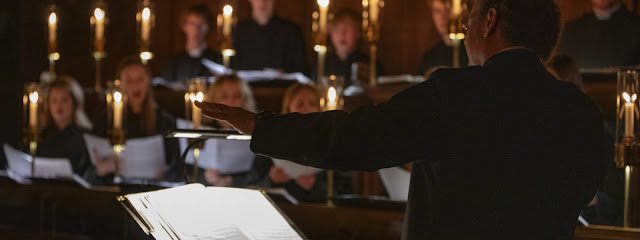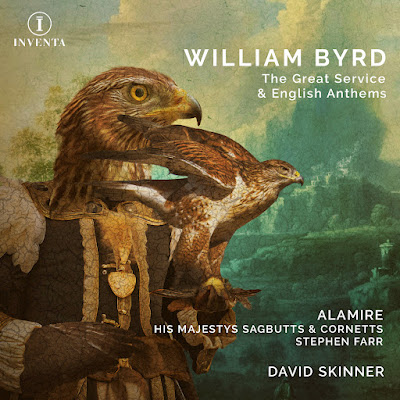 |
| Alamire & His Majesty’s Sagbutts and Cornetts at All Hallows Gospel Oak for recording sessions for Byrd’s Great Service |
For such a large-scale and important work, William Byrd’s Great Service remains tantalising in many ways and complete performances have been relatively rare on disc. We don’t really know when it was written, the earliest partbooks date from the last years of the 16th century and it is thought to have been written for the the Ruby Jubilee of Elizabeth I.
The text used is that of the Elizabethan Book of Common Prayer which was superceded in 1604. It was never published in Byrd’s lifetime and survives in a disparate group of early part books. Byrd wrote it for the Chapel Royal whilst his other surviving Anglican services are presumed to have been written for Lincoln Cathedral earlier in Byrd’s career.
It is a substantial work, setting the seven seven movements which by tradition were sung during the main services of the Anglican liturgy – Matins, Holy Communion, and Evensong – for the two choirs of five voices (mean, two tenors, baritone, bass), ideally with at least two people to each part to take account of Byrd’s kaleidoscopic scoring requiring full passages and verse passages with only one voice singing each part. The full choir sections were doubled by organ (organ parts survive) though there is documentary evidence of the use of cornetts and sackbuts too.
David Skinner and his ensemble, Alamire chose to record the work as the last of their three albums celebrating Byrd’s anniversary. They released Byrd 1588, the first complete recording of his 1588 collection, Psalmes, Sonets & songs of sadnes & and pietie on Resonus Classics Inventa label in 2021 with Byrd 1589, recording Byrd’s 1589 Songs of sundrie natures in 2023, thus meaning that all of Byrd’s early songs were now on disc. For their third disc, released this month, David Skinner conducts Alamire, His Majestys Sagbutts & Cornetts and organist Stephen Farr in Byrd’s The Great Service and a selection of his English Anthems.
But David’s choice of Byrd’s The Great Service deliberately reflects another anniversary too, that 1924 represented the modern premiere of the work after it was rediscovered (in Durham) by E.H. Fellowes and included in his Tudor Church Music series in 1922.
It is a work that David has known his entire life and the first recording of it that he heard, Stephen Cleobury‘s recording [currently on Warner Classics] with the choir of Kings College, Cambridge had a striking effect on David. The recording, made in the 1970s, was a huge undertaking and the sound is extraordinary with the etherial sound of the boys voices. In fact, during our interview in his study at Sidney Sussex College, David gives me a compare and contrast moment, playing the same passage on different recordings, this is because David’s recording with Alamire is the first to be done at low pitch. David mentions six recordings including Cleobury’s, three with boys voices and countertenors, and three with mixed professional choirs, and most of these perform the work up a minor third.
For most of the 20th century, it was the orthodoxy to perform Byrd’s Anglican church music at high pitch, often transposed up a minor third. This has the effect of making the music fit the modern collegiate and cathedral choir, with boys voices and male countertenors. For his recording, David has reverted to low pitch and created a sound world that is probably closer to that which Byrd might have heard. As with most of David’s recordings, there is an historical and research perspective to the the project. With The Great Service this means that the recording is the first to be issued at this low pitch, eschewing the use of countertenors with tenors on the middle two parts. For David this helps reveal the sheer richness of Byrd’s scoring, but the decision is also rooted in our understanding of the development of performance practice in church music.
David makes the surprising, yet well-documented statement that the countertenor does not have a role in English church music until after the Reformation, before then choirs largely used two lines of boys, high trebles and altos. If we look at the Eton Choir Book, which reflects music performed in Eton Chapel in the late 15th century the music is combines four adult male voices, very low bass part, baritone and two tenors with boys on the top, often dividing into high and low, and the music has an extremely wide compass (from the basses lowest not to the boys highest). Following the Reformation in England, when all the choir schools associated with the Roman Catholic establishments closed, choir training changed and the tradition of very high boys voices was lost. Music kept the four lower male voices but the top lines merged into one, the mean, and this type of scoring reflects closer to the Continental tradition.
 |
| David Skinner and Alamire (Photo: Clive Barda) |
Stephen Cleobury’s recording, mentioned earlier, uses boys, two countertenor lines, tenors and basses, reflecting the modern practice in The Great Service, whereas David and Alamire use women, two tenor lines, baritones and basses, leading to a remarkable richness of sound with the two tenor lines have an astonishing effect, in contrast to Cleobury’s performance where the top three lines (boys, countertenors) give a more transparent, etherial sound.
David also uses the sort of forces that might have sung the work in Byrd’s day at the Chapel Royal, so around 30 singers which means the lower four parts are all two men per part. This is reinforced by cornets and sackbuts on the very top and bottom lines, along with an organ. In terms of scope and size, David describes The Great Service as the biggest thing Byrd ever wrote, with the music making full use of two choirs along with a solo quartet.
When it came to choosing music for Alamire’s Byrd discs, David’s preference, in his recording projects, was to record pieces that have not been done before, or where the performance reflects a new historical perspective. So Byrd’s 1588 collection had never been recorded before in its entirety, and by choosing The Great Service, David ensured that Alamire finished their trilogy with not only something massive, but a performance that gave the work a new voice. Also, he regards it as a great way to go out, as he does not feel he needs to record any more of Byrd’s music. As well as The Great Service the disc also includes seven of Byrd’s English anthems, works which remain relatively neglected compared to Byrd’s Latin church music.
It was a large project in many ways, for instance using two singers per part on the lower four lines (with three women part part on the top lines) meant engaging eight tenors who were comfortable with this repertoire. But David thinks the recording has come together well, reflecting the right pitch and the right pacing with singers and players he trusted. For David, this music demands passionate singing, again something reflected by the change in scoring with the excitement of two tenor parts.
 |
| David Skinner & Choir of Sidney Sussex College (Photo: Choir of Sidney Sussex College) |
David’s other recent project, released last year on the Inventa label, was a recording of the Missa Myns liefkens buryn ooghen and Missa Fors seulement by Jheronimus Vinders (fl 1526/26) with the choir of Sidney Sussex College. Little is known of Vinders who seems to have worked at Ghent Cathedral and who wrote a lament on the death of Josquin. The music’s editor sent scores to David who felt that it suited the college choir (where David is director of music), and he describes it as very dark music. And David commends the quality of the choir at the moment, with a high standard of singing and reading, adding that he did not have that ten years ago when he first became director of music.
Next year, Alamire celebrates its 20th anniversary and David feels that they have 12 intense, large-scale projects to be proud of. Many of these chimed in with David’s academic work, and he comments that they have covered a lot. Nowadays so many people are making recordings that he is not certain where they might be going next. He has ideas for a Summer school and more educational projects, but this needs funding. Also, he hopes to be doing more concerts with Alamire and perhaps more touring, and he points out the practically everything he has recorded with Alamire has not been toured. They will be in Krakow next year (2025) and have a project in Rome that year too which will combined older music with that of a local contemporary programe.
William Byrd: The Great Service & English Anthems, Alamire, His Majestys Sagbutts & Cornetts, Stephen Farr, David Skinner – Inventa
Jheronimus Vinders: Missa Myns liefkens bruyn ooghen & Missa Fors seulement – The Choir of Sidney Sussex College, Cambridge, Andrew Lawrence-King (psaltery & harp), David Skinner – Inventa
The blog is free, but I’d be delighted if you were to show your appreciation by buying me a coffee.
Elsewhere on this blog
- Discovering Imogen: A relatively underrated British composer, Imogen Holst is put centre stage in this brand-new recording on NMC – record review
- Exquisite vocal lines & imaginative storytelling: Harry Christophers & The Sixteen focus on Stanford’s secular choral music in Partsongs, Pastorals and Folksongs – record review
- Music of a Silent World: Chanticleer in an eclectic recital exploring the natural world – review
- A Road Less Travelled: in advance of its London premiere, Alec Roth discusses his 2017 song cycle to poems by Edward Thomas – interview
- Drawing you in: Ensemble OrQuesta combined physical theatre with comedy & a sense of anger in Mozart’s Le nozze di Figaro at Grimeborn – opera review
- To Lviv with Love: Paul
Mann combines conducting in the Ukraine with investigating neglected
composers for Toccata Classics, including the Swiss composer Richard
Flury – interview - Prom 52: Intelligent, vivid & satisfying account of Bizet’s Carmen from Rihab Chaied, Evan LeRoy Johnson, Anja Bihlmaier at Glyndebourne’s visit to the BBC Proms – opera review
- Prom 50: Two rarities and a classic from Jakub Hrůša and Czech Philharmonic – concert review
- Prom 49: A consumate & deeply felt account of Suk’s Asrael Symphony crowns the Czech Philharmonic’s first Prom appearance – concert review
- Far from special interest: discs of brass band music by Arthur Bliss and Malcolm Arnold, two brilliant and highly satisfying portraits – record review
- Home












